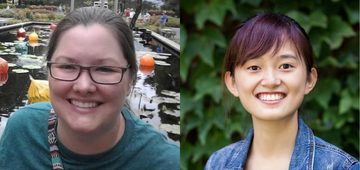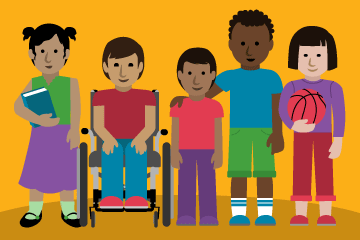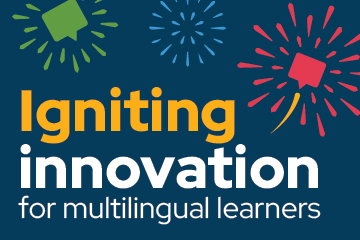Featured Interns: Jeanne Beck and Wenyue Ma

Meet Jeanne Beck and Wenyue Ma, the 2022 WIDA Summer Research Interns! Jeanne and Wenyue are graduate students who spent the summer working with the WIDA assessment team and participating in research projects on K-12 academic language development.
Scroll down to read interviews between Jeanne (JB), Wenyue (WM) and Katie Stenz (KS), a WIDA staffer.
Note: The following content has been lightly edited for clarity and length.
Get to know Jeanne Beck
KS: Where do you go to school?
JB: I go to Iowa State University.
KS: What are you studying?
JB: I’m getting a Ph.D. in applied linguistics and technology.
KS: What do you like doing in your free time?
JB: I like exploring state parks and other natural places in my home state, Missouri, and in Iowa by walking, biking, hiking and kayaking.
KS: What’s a fun fact about you?
JB: I’ve taught English learners in three countries (including the U.S.) and am a certified K-12 teacher in two states.
Jeanne + WIDA
KS: Why WIDA? What about the WIDA Summer Research Internship piqued your interest?
JB: I first learned about WIDA when I began teaching elementary English learners (ELs) in a rural Missouri public school district and had to administer the WIDA Screener and ACCESS for ELLs. When I came to Iowa State, two of my classmates had interned at WIDA so I decided to go for it too!
KS: What have you been working on during your time at WIDA?
JB: I am working on the EL identification project, in which we survey district EL administrators and teachers, as well as interview EL teachers across rural, suburban and urban school districts, in order to learn about the local policies and practices that are used to identify ELs. I am also working on the WIDA Screener for Kindergarten project, where we are analyzing WIDA Screener for Kindergarten name writing and narrative writing samples in order to determine how young multilingual learners’ writing differs between low-, mid- and high-level English language proficiencies. We are also looking at how emerging writing differs between name writing and narrative writing tasks, and how multilingual kindergarteners construct written narratives in English.
KS: Are there things you’ve learned that you will bring to your next professional endeavor?
JB: Thanks to the EL identification project, I improved my Qualtrics skills, as well as survey and interview protocol creating skills, which will help with future research projects. It was also rewarding to use some of my personal experience as a teacher to help construct those research instruments. Thanks to the WIDA Screener for Kindergarten project, I learned how to use NVivo and learned a lot about kindergarten narrative writing. I think I can now say I’m an expert at reading kindergarten writing, which will come in handy, since I also concurrently teach/work as an EL coordinator in a K-6 school.
KS: What’s one thing you’ve learned that you’d like educators around the country to know?
JB: Conducting an informative, empirical, as well as ethical research project takes a really long time. As a K-12 EL teacher/administrator, it’s frustrating when you see something that doesn’t work well and think – well, why don’t they just fix that? To keep a long answer short, there is a lot of data gathering and analysis that needs to be done behind the scenes so that changes to these large-scale and high stakes tests are justified by empirical evidence. That’s not always what we in the field want to hear but keep sharing your opinions because you are heard. Also, keep an eye out for WIDA publications – there are a lot of helpful projects in the works here to make these assessments more accessible and equitable for learners. I think I became that person sitting in on WIDA Zoom meetings because I kept writing “awesome!” or “that sounds really helpful!” whenever they presented something in the works.
Get to know Wenyue Ma
KS: Where do you go to school?
WM: I go to Michigan State University.
KS: What are you studying?
WM: I’m getting a Ph.D. in second language studies with a concentration in language testing and assessment.
KS: What do you like doing in your free time?
WM: I like playing badminton, playing board games with friends and watching animation and comics.
KS: What’s a fun fact about you?
WM: I studied textile engineering as my major and finance as my minor in my undergraduate studies.
Wenyue Ma + WIDA
KS: Why WIDA? What about the WIDA Summer Research Internship piqued your interest?
WM: I first learned about WIDA from one of the students in my Ph.D. program, Shinhye Lee, who was the first WIDA graduate research intern. She shared plenty of nice experiences she had during her internship and encouraged many junior Ph.D. students in our program who are interested in assessment to apply. My motivation to apply for an internship at WIDA relates to my interests in K-12 English as a second language (ESL) and English as a foreign language (EFL) teaching and testing, which stemmed from my internship experience at Disney English in China where I taught young Chinese English learner students. I think this internship is a wonderful opportunity to learn more about K-12 ESL teaching and learning.
KS: What have you been working on during your time at WIDA?
WM: During the ten-week internship, with great excitement, I have been involved in two research projects related to the ACCESS for ELLs Speaking test. One focuses on the relationship between the evaluations of students’ speaking performance that are provided by ACCESS for ELLs speaking raters and teachers. The other one aims to understand how the complexity and fluency features of students’ spoken language vary by students’ proficiency levels, academic content and task features.
KS: Are there things you’ve learned that you will bring to your next professional endeavor?
WM: The two projects noted above have provided a wonderful opportunity for me to collaborate with prominent researchers in language testing and assessment and learn from their knowledge and expertise. In addition, the experience of working with valuable test data expands my knowledge of the application of various statistical techniques in test validation.
KS: What’s one thing you’ve learned that you’d like educators around the country to know?
WM: Successful test development and test validation require collaboration and communication between researchers and educators. The contrasting group study that I assisted with during my internship highlighted the importance and the great value of teachers’ input in test validation research.





